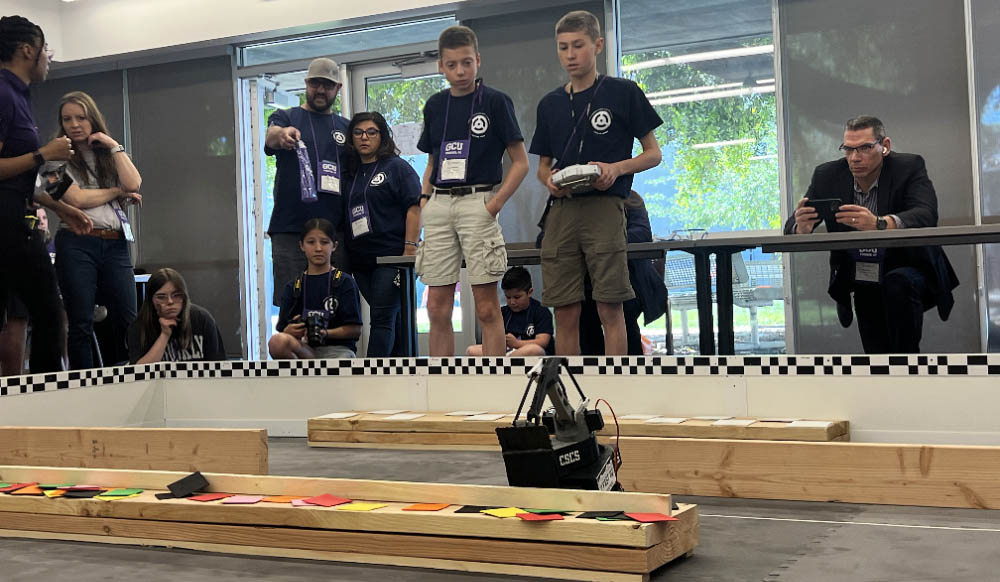
Story and photos by Scianna Garcia
Students from around the country gathered to see which robot would make the most “sandwiches.”
The sandwiches were actually stacks of mini craft foam squares, and teams had just under three minutes to remotely control their robots to repetitively form sandwiches and ring a bell.
“The Lunchroom Bandits,” high schoolers also known as junior Logan Fyke, freshman Jackson Malham and senior Owen Morgera, looked up at the score brackets after their turn at Saturday’s International Christian STEM Competition (ICSC) on the Grand Canyon University campus.
The trio from Trinity Christian Academy in Florida spent the last four months preparing their robot for the challenge.
While the team struggled a bit with the autonomous portion of the event, their hopes remained high for the next run.
“We just reprogrammed it to hopefully work the next time, so we're feeling pretty confident,” said Fyke.
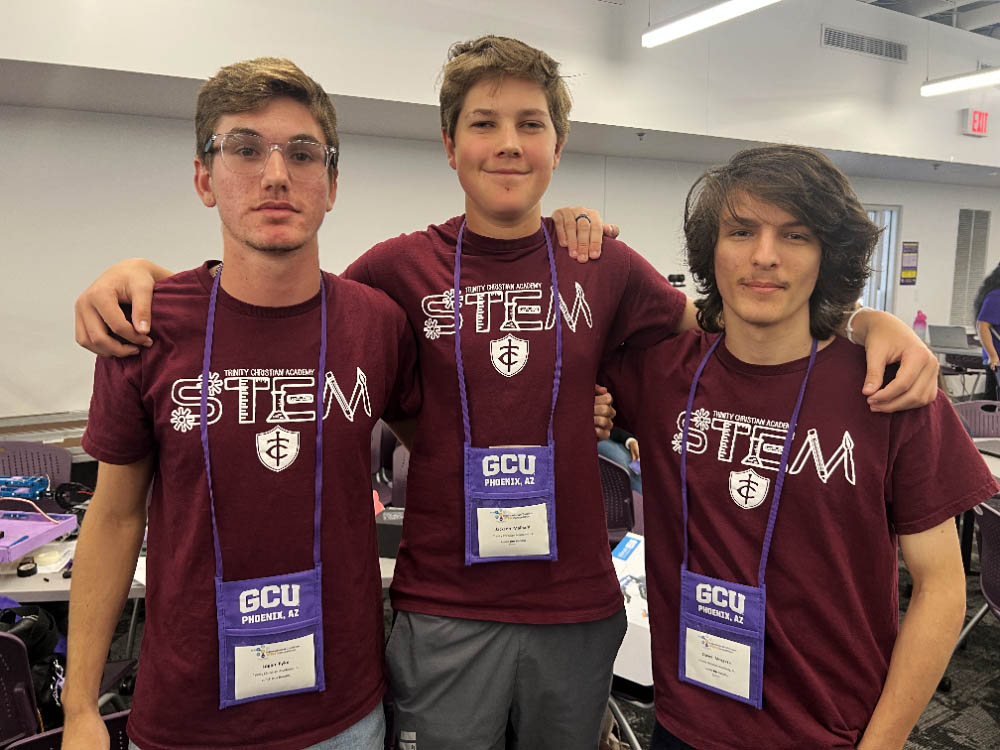
Trial and error was a common theme among the 24 nationally represented schools competing at the second annual ICSC.
In partnership with the Association of Christian Schools International, the GCU K12 Educational Development team created eight challenges to promote STEM in Christian schools. Students not only tackled traditional categories such as robotics, aerospace glider, software development, onsite design, cybersecurity and biomedical engineering but also a category that speaks to who GCU is as a missional Christian university: innovation and service.
Before the ICSC, 11 divisional competition sites were hosted throughout the nation. The top three winners from each of the eight challenges were invited to Saturday’s competition. Participants ranged from grades six to 12.
“We are on a missional purpose here to glorify God and help people understand that science and STEM are not in contradiction to the Lord’s message, but that we are glorifying his world through the understanding of science and through engineering to build solutions for people worldwide,” said Marni Landry, K12 STEM Outreach Director.
Landry pointed to the innovation and service category, which uses STEM to solve a problem in the community. It was inspired by Wash the City, a Canyon Ventures business in which entrepreneur Jayce Candrea, a GCU alumnus, uses proceeds from sales of T-shirts to help the homeless.
“Each one of the competitions is driven by Scripture,” added Landry.
One unique scoring aspect of the competition is the live interviews, in which judges ask teams about how they overcame challenges and how Scripture guided their inspirations.
Also participating in the robotics challenge was “The Tater Tots,” a squad of four girls from Vineyard Christian School in Texas.
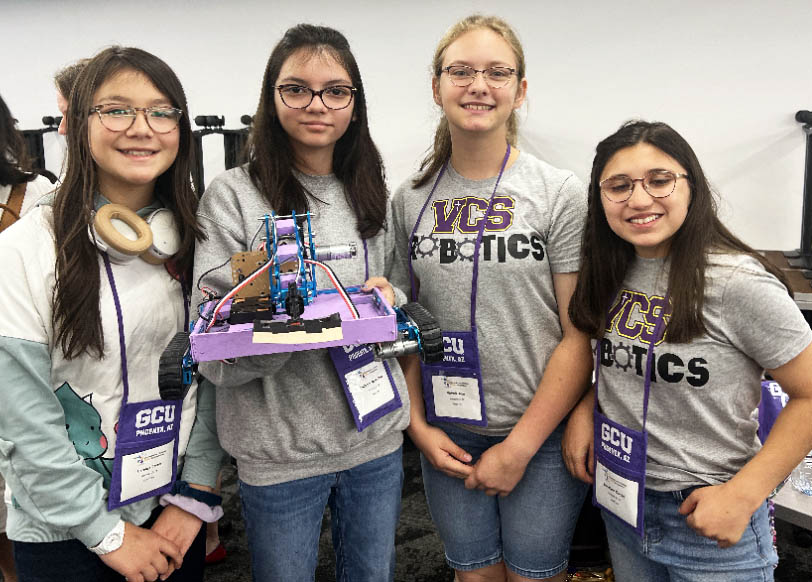
For seventh grader Victoria Gass, the ongoing support and companionship are what she enjoyed most about the competition.
“I really like that whenever we compete, the teams we’re against are still cheering us on. It gives everyone such a good vibe,” said Gass.
Teammate Florence Torres, a sixth grader, took the challenges as a learning opportunity.
“I like how you can see the progress of all the other teams and how they built and adapted their robots so that they can make a sandwich. Since you're competing against other people, you can see how they do it themselves, look at that and improve yourself,” said Torres.
The ICSC brings many opportunities for building experience, as well as networking with GCU professors, students and industry professionals.
Judges included industry representatives from engineering, technology and cybersecurity companies who evaluated competitors right alongside GCU’s own students.
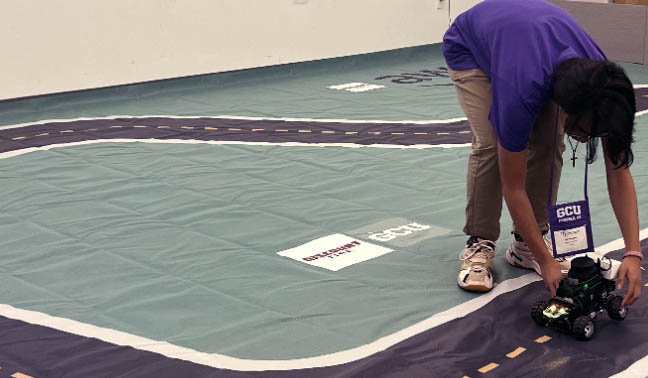
Mentorship is a way the University’s students can share their knowledge and experiences in STEM with the younger generation.
Ajaya Macon, a sophomore studying biomedical engineering, said it was no easy task to prepare for judging the challenges.
“We helped with constructing the field, and judges had training to learn about specifications in order to be fair to everyone,” she said.
Macon was a first-time judge this year. She said it was phenomenal experience.
“I love that I get to be a part of something that is so foundational, and it’s cool to see that it can spark something in their brains and they can go forward with engineering from there.”
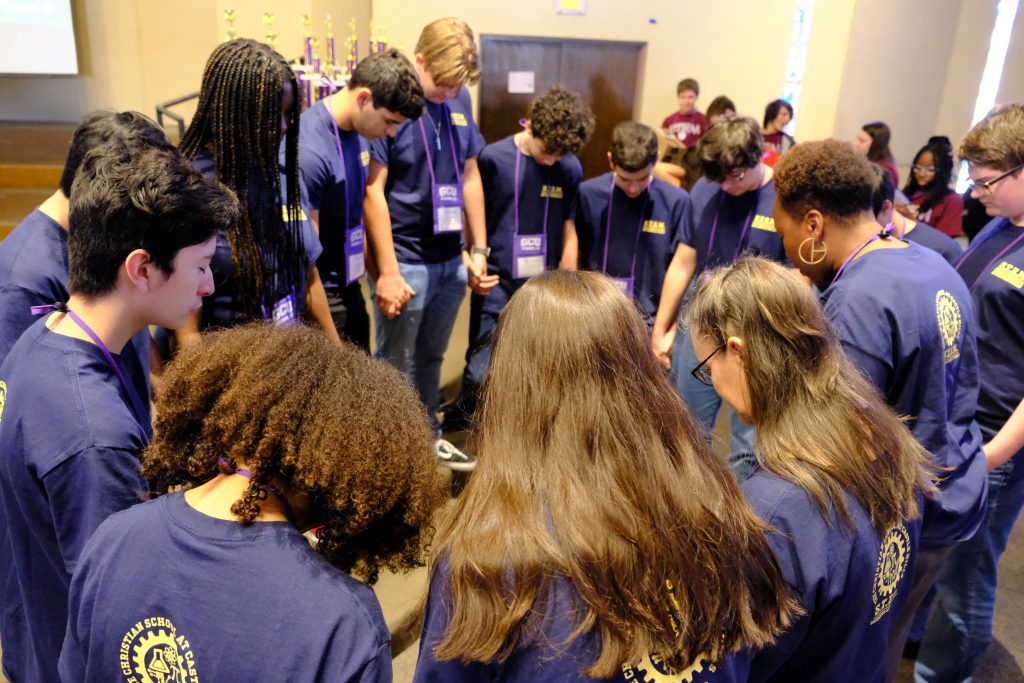
Adrianna Ruby, also a sophomore studying biomedical engineering, said being a first-time judge was an eye-opening experience.
“It’s so cool to see all these kids doing such incredible things, because when I was in middle school, I didn’t know half of what they know. Seeing them enjoy and excel in this STEM field is cool, and I just love interacting with these kids,” she said.
Ruby added, “Having this hands-on experience with making a robot is preparing them for how to problem-solve and set specific goals to conquer, which will help them in any field of STEM.”
Across the room from the robotics sandwich-making challenge was the Deep Racer competition, in which teams navigated fully autonomous race cars on a track. They used artificial intelligence machine learning to “teach” the cars.
It was no easy task.
Kaiya Cross, an IT applications GCU student, said the most difficult part of the challenge was adapting the car to the real world from the simulation world.
“It’s not perfect. There’s a lot of randomness,” Cross explained, adding how students were tasked to exercise learning reinforcements to teach the AI vehicle organic, human-like thinking.
In the ICSC, students experience constant failures — and successes — but teams persevere with motivation and a willingness to serve the Lord.
“You're driven for your purpose to serve others by learning science and understanding how science can help your neighbor and help humanity,” said Landry. “We are serving one another through STEM.”









































































